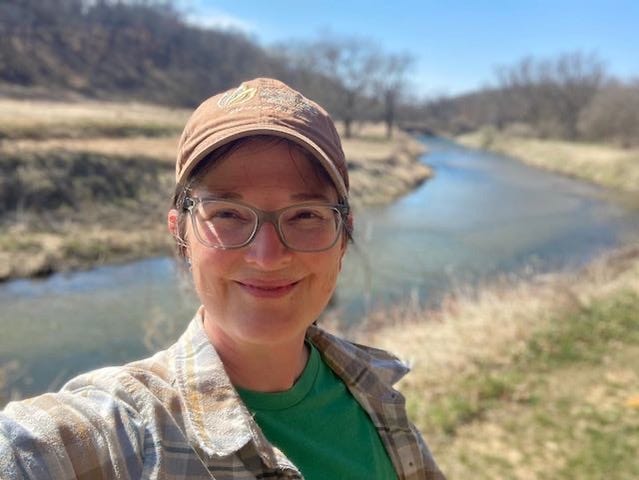Pulling open the wooden door of Montezuma’s old Carnegie library took some muscle, a good heave. The reward was immediate. Sometimes I still smell that alchemy of dust, old books, and wood polish in used book shops or less visited stacks at other libraries, and am transported back to the magical portal that was my childhood library’s interior staircase.
I read age-appropriate books – Shel Silverstein, Judy Blume, the Choose Your Own Adventure series, Ann Martin’s Baby-Sitter’s Club, and Carolyn Keene’s unflappable Nancy Drew – but I also devoured the works of Agatha Christie, Stephen King, Maya Angelou, Shakespeare, and Betty Smith’s A Tree Grows in Brooklyn. I loved biographies of Sojourner Truth, Abraham Lincoln, Sacajawea, Joan of Arc, and Annie Oakley. I especially enjoyed histories of the Titanic, Union spies during the Civil War, and all the ghost or vampire stories I could get my hands on.
“Are you really going to read all those books?” an adult asked once as I stood at the librarian’s desk, watching her stamp the due date inside each one of my mighty pile. I remember looking up at this woman, face flushed, and stating, “Yes, I do read them all.”
Our town didn’t have any museums when I lived there. There were no art galleries, water parks, or movie theaters. My family didn’t vacation in other countries or go on cruises. I didn’t have the access a city kid or a rich kid might have to interact with many people whose lives were very much different from my own, or my family’s. But, in the time it took me to ascend the library’s steps and hunker down among its shelves, I traveled continents and centuries.
Iowa’s Republican legislators want you to believe that this library endangered me. They might judge the librarian and my parents as neglectful in allowing me such freedom to read. Alabama Republicans recently introduced House Bill 4 proposing to jail librarians for shelving books that are “harmful to minors.” Iowa’s Republican legislators have not gone that far, yet, but the Heritage Foundation’s Project 2025 calls for registering such librarians as sex offenders.
Iowans have stood up to book bullies before. Leanore Goodenow taught English in a 12-grade consolidated school in Argyle, Iowa in 1929. Two school board members were also members of the Ku Klux Klan. Goodenow was lucky to find an ally in the school board secretary, whom Klan members had once pulled from his horse and severely beaten. Promoted to superintendent, Goodenow instituted school-day reforms limiting the KKK’s attempts to recruit students from the school. Klansmen showed up at the next school board meeting with guns.
The Argyle school lacked a library, so Goodenow ordered books from the State Traveling Library. One Friday, a student shared that all the books had been borrowed. He eyed the copy of Knut Hamsun’s Growth of the Soil sitting on the corner of Goodenow’s desk and begged to borrow it. Goodenow had ordered it for herself, but consented. For this act, the student’s parent, a Klan member, argued that Goodenow should lose her job. There were inappropriate scenes in the book, the parent insisted! The school board called for a special meeting. Goodenow’s job was in jeopardy.
Undeterred, Goodenow attended the meeting and read passages of the book aloud. She doubted that any of the school board members had ever been read to, much less from such a moving story. “There’s worse things than that in the Bible,” replied one of the school board members. Indeed. The board unanimously re-elected Goodenow as superintendent.
Today, Iowa’s white nationalists aren’t beating school board secretaries. They aren’t yet bringing their guns to school board meetings. They do speak freely from the highest levels of elected government, and they are still obsessed with censoring books.

Iowa Senate File 496 requires schools to remove books with depictions of sexual acts from K-12 libraries and classrooms, and prohibits education about gender identity and/or sexual orientation in kindergarten through sixth grades. A federal judge had temporarily blocked this legislation in December 2023. The State of Iowa appealed and, in July 2024, won.
Iowa’s legislators seem to believe that stories by and about LGBTQ people may somehow “turn” kids LGBTQ. My childhood obsession with vampire and ghost stories did bring me some bad dreams. I was a thrilling guest at slumber parties. But, try as I might, I never was able to turn myself into a supernatural creature. The best books are transformative. There is a difference, though, between a story’s resonance and actually becoming the characters. Kids understand this even if Republican legislators don’t.
Iowa’s Republicans are right that reading does change hearts and minds. Books provide a safe harbor to kids who may otherwise feel alone in their families, schools, and communities just because they are “different.” Reading about difference can help all of us to develop more empathy and respect.
Have Iowans tried reading to their Republican legislators? They might try it.
It’s not books Republicans really fear, but the empowerment of any child who pulls open that library door.
Bio:
Angie Carter is originally from Iowa and now lives in Michigan’s Upper Peninsula. She is an associate professor at Michigan Technological University and a board member of the Women, Food and Agriculture Network.
Emerging Voices is pleased to be part of the Iowa Writers Collaborative. Read and support the work of a very talented roster of writers in the IWC Sunday Round-Up.




This post evoked vivid, sensual memories of the library in my home town. At age six, I was allowed to walk down and cross Main Street on my own. The librarian, who sat facing the heavy front doors and peered at you over her spectacles when you walked in, was intimidating, but no doubt would have been equal to heroism had anyone dared to question her authority. Here is to all the heroic librarians. I love the idea of sitting down legislators and reading aloud to them. Thank you for a timely and timeless post.
Thank you Mary for Emerging Voices. Wonder article by Angie Carter. Libraries are essential!